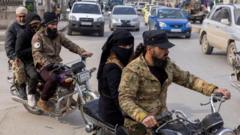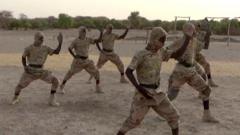Idlib, once a war-torn region, has seen improvements since Hayat Tahrir al-Sham (HTS) took control in 2017. While the governance has brought some stability and development, concerns over authoritarianism and the treatment of minorities persist amidst hopes for a better future.
Idlib's Transformation Under Rebel Rule: A New Era or Continued Struggle?

Idlib's Transformation Under Rebel Rule: A New Era or Continued Struggle?
Examining Idlib's journey since Islamist group HTS took control, this article highlights the region's tenuous stability and ongoing challenges.
Empty line 4
In the remote north-west of Syria, the aftermath of years of civil war is still visible through abandoned military positions and war remnants. Since 2017, Idlib has been largely under the control of the Islamist group Hayat Tahrir al-Sham (HTS), which emerged as a key player in the opposition. Following the ousting of Bashar al-Assad, the organization has established itself as the de facto authority, attempting to spread its governance model throughout the country.
In the heart of Idlib, public places exhibit opposition flags, and graffiti resonates with tales of resistance against the former regime. Although the scars of war are evident in the destroyed buildings, signs of hope, like new shops and maintained roads, indicate some positive changes since HTS's rise. However, residents also voice concerns about the group's heavy-handed rule.
Dr. Hamza Almoraweh, a local cardiologist, reflects on the developments witnessed in Idlib since the group took control. While he acknowledges the progress, particularly in public services provided by HTS, he stresses his reluctance to consider returning to his former home in Aleppo, even under the new regime.
HTS, previously linked to al-Qaeda, has sought to rebrand itself as a nationalist force focused on governing rather than jihadism. Yet, it remains designated as a terrorist organization by several countries and international bodies, including the US and Turkey. Charged with managing resources, the group administers services like water and electricity, funded by taxes from local businesses.
As the situation evolves, HTS has relaxed some of its previous strict regulations, allowing more freedoms compared to the Assad era. Activist Fuad Sayedissa, who recently returned to Idlib after a decade of living in Turkey, remarks on the limited space for dissent that appears to exist under HTS, unlike the repression experienced under Assad.
However, protests against the new government have also surfaced, illustrating the tensions and dissatisfaction among citizens. Experts note that HTS has consolidated power by targeting extremists and rivals, igniting fears of possible authoritarianism.
In nearby villages, such as Quniyah, communities are cautiously optimistic. Church bells rang for the first time in ten years to mark Assad's removal, and local religious leaders express hope for a more tolerant environment under HTS, although mistrust lingers regarding the group's true intentions.
For many Syrians, the fall of Assad is bittersweet. Amidst celebrations, there is an underlying anxiety about the future—fear of a new dictatorship lurking beneath the surface of newfound freedoms. As local voices call for accountability and a genuine democratic process, concerns remain entrenched over HTS’s rule and its implications for various ethnic and religious populations.
In the remote north-west of Syria, the aftermath of years of civil war is still visible through abandoned military positions and war remnants. Since 2017, Idlib has been largely under the control of the Islamist group Hayat Tahrir al-Sham (HTS), which emerged as a key player in the opposition. Following the ousting of Bashar al-Assad, the organization has established itself as the de facto authority, attempting to spread its governance model throughout the country.
In the heart of Idlib, public places exhibit opposition flags, and graffiti resonates with tales of resistance against the former regime. Although the scars of war are evident in the destroyed buildings, signs of hope, like new shops and maintained roads, indicate some positive changes since HTS's rise. However, residents also voice concerns about the group's heavy-handed rule.
Dr. Hamza Almoraweh, a local cardiologist, reflects on the developments witnessed in Idlib since the group took control. While he acknowledges the progress, particularly in public services provided by HTS, he stresses his reluctance to consider returning to his former home in Aleppo, even under the new regime.
HTS, previously linked to al-Qaeda, has sought to rebrand itself as a nationalist force focused on governing rather than jihadism. Yet, it remains designated as a terrorist organization by several countries and international bodies, including the US and Turkey. Charged with managing resources, the group administers services like water and electricity, funded by taxes from local businesses.
As the situation evolves, HTS has relaxed some of its previous strict regulations, allowing more freedoms compared to the Assad era. Activist Fuad Sayedissa, who recently returned to Idlib after a decade of living in Turkey, remarks on the limited space for dissent that appears to exist under HTS, unlike the repression experienced under Assad.
However, protests against the new government have also surfaced, illustrating the tensions and dissatisfaction among citizens. Experts note that HTS has consolidated power by targeting extremists and rivals, igniting fears of possible authoritarianism.
In nearby villages, such as Quniyah, communities are cautiously optimistic. Church bells rang for the first time in ten years to mark Assad's removal, and local religious leaders express hope for a more tolerant environment under HTS, although mistrust lingers regarding the group's true intentions.
For many Syrians, the fall of Assad is bittersweet. Amidst celebrations, there is an underlying anxiety about the future—fear of a new dictatorship lurking beneath the surface of newfound freedoms. As local voices call for accountability and a genuine democratic process, concerns remain entrenched over HTS’s rule and its implications for various ethnic and religious populations.






















